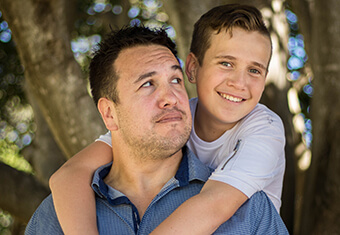There are several options to consider when planning to provide for a child with a disability after death. These options include Henson trusts (a form of discretionary trust), Qualified Disability Trusts, Registered Disability Savings Plans, Lifetime Benefit Trusts, and Preferred Beneficiary Elections.
What is a Henson trust?
A Henson trust is a trust designed to benefit persons who are receiving or may become entitled to receive disability benefits from the government. The purpose of a Henson trust is to protect assets of a beneficiary while preserving the right to collect government benefits. Henson trusts are sometimes also called “absolute discretionary trusts”.
Henson trusts are often set up in a parent’s will (i.e., as a testamentary trust), but can also be set up during the lifetime of the parent. Testamentary trusts may be eligible for more favourable tax treatment if the trust also qualifies as a Qualified Disability Trust (see below).
How does a Henson trust work?
The key to a Henson trust is that the trustee has “absolute discretion” to decide whether, and in what amount, to provide assistance to the beneficiary using the assets of the trust. Because the trustee has this “absolute discretion,” in most provinces the assets are not considered to be vested in the beneficiary and cannot be used as a basis for the denial of government benefits that are calculated based upon the assets of the beneficiary.
Where does a Henson trust work?
Henson or Henson-style trusts are available in Ontario, British Columbia, Manitoba, New Brunswick, Newfoundland, Nova Scotia, Prince Edward Island, Saskatchewan, the Yukon, Alberta and Québec. Outside of Ontario, these trusts are typically called “discretionary trusts”.
What is a “Qualified Disability Trust”?
Henson trusts may qualify for lower tax rates if they satisfy the “Qualified Disability Trusts” (QDT) criteria as defined in the Income Tax Act. To qualify as a QDT, the following criteria must be satisfied:
- The trust must be a testamentary trust (i.e. made by a Will)
- The trust must be resident in Canada for the trust year
- The trust and beneficiary must have made a joint election for the trust to be a QDT
- The beneficiary must be approved for the Disability Tax Credit
- The trust must be the only QDT for that beneficiary
The limitation of one QDT per beneficiary means that if both the parents and the grandparents want to set up a Henson trust, only one of the trusts could qualify as a QDT. Further, eligibility for the Disability Tax Credit requires certification by a medical professional that the beneficiary has a severe and prolonged physical or mental impairment.
Choosing a trustee
It is important to keep in mind that a trustee position may continue for an extended period of time after the death of the person creating the trust. Further, because a properly drafted Henson trust grants absolute discretion to the trustee, the trustee will be closely involved and have broad discretion in determining when and how much to provide for the child with a disability. It is therefore important to select a trustee who is trustworthy and who understands the needs of the child.
What is a Registered Disability Savings Plan?
A Registered Disability Savings Plan (RDSP) is a savings plan intended to help save for the long-term benefit of a person who is eligible for the Disability Tax Credit. RDSPs provide access to grants and bonds on a means-tested basis for beneficiaries up to the age of 49. To be eligible as the beneficiary of an RDSP, an individual must:
- Be eligible for the Disability Tax Credit;
- Have a valid social insurance number;
- Be a resident in Canada at the time that the plan is created; and
- Be under the age of 60 (an application must be made before the end of the calendar year in which the individual turns 59)
There is a lifetime contribution limit of $200,000 to an RDSP, and contributions are allowed until the end of the year in which the beneficiary turns 59. The holder of the RDSP opens and manages the RDSP. Contributions to the RDSP can be made by anyone but must be authorized by the holder. The parent of a child with a disability can open an RDSP for the child if they are under the age of majority and may continue on as the holder of the plan after the child reaches the age of majority. If the child is over the age of majority and contractually competent at the time of opening the RDSP, the child must be the plan holder.
What is a Lifetime Benefit Trust?
A Lifetime Benefit Trust (LBT) is a trust created to eliminate tax where an RRSP or RRIF is left to a dependent child with a mental infirmity. An LBT may be structured as a Henson Trust. If a parent intends to leave an RRSP or RRIF to a child with a disability, it may be beneficial to set up an LBT. Please speak with a TEP if you think an LBT may be in the best interests of your child.
Preferred Beneficiary Election
Income of a trust is generally taxed in the trust or taxed in the hands of one or more beneficiaries who have received the income. The Preferred Beneficiary Election allows income to be taxed in the hands of one of the beneficiaries without any payment actually being made.
One potential benefit of making the election is that it may be possible obtain a lower tax rate on income of the trust. Additionally, if the amount is not actually paid to the beneficiary, this allocation may not be counted as income for the purposes of provincial disability payments, thereby protecting and preserving the right of a disabled beneficiary to collect government benefits.
If an individual is eligible for the Disability Tax Credit, they are generally also eligible for the Preferred Beneficiary Election. Since only one QDT can be created per individual, if the parents and grandparents both want to set up trusts benefitting that individual, it may be advantageous to make the preferred beneficiary election for trusts other than the QDT.
For further information or assistance in estate planning to benefit a child with a disability, please consult a TEP.
 Canada
Canada  UK
UK










